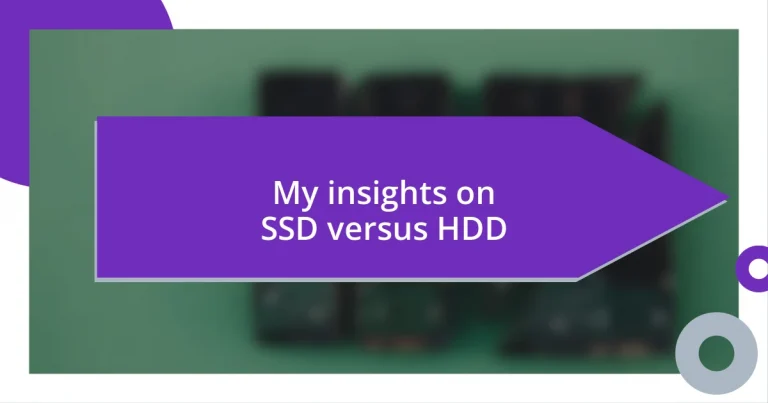Key takeaways:
- SSDs offer superior speed, durability, and energy efficiency compared to HDDs, making them ideal for high-performance tasks and mobile use.
- HDDs are more affordable and provide larger storage capacities, making them excellent for media storage, data backups, and archiving purposes.
- The choice between SSDs and HDDs should be based on individual needs, considering factors like performance, storage requirements, and budget constraints.
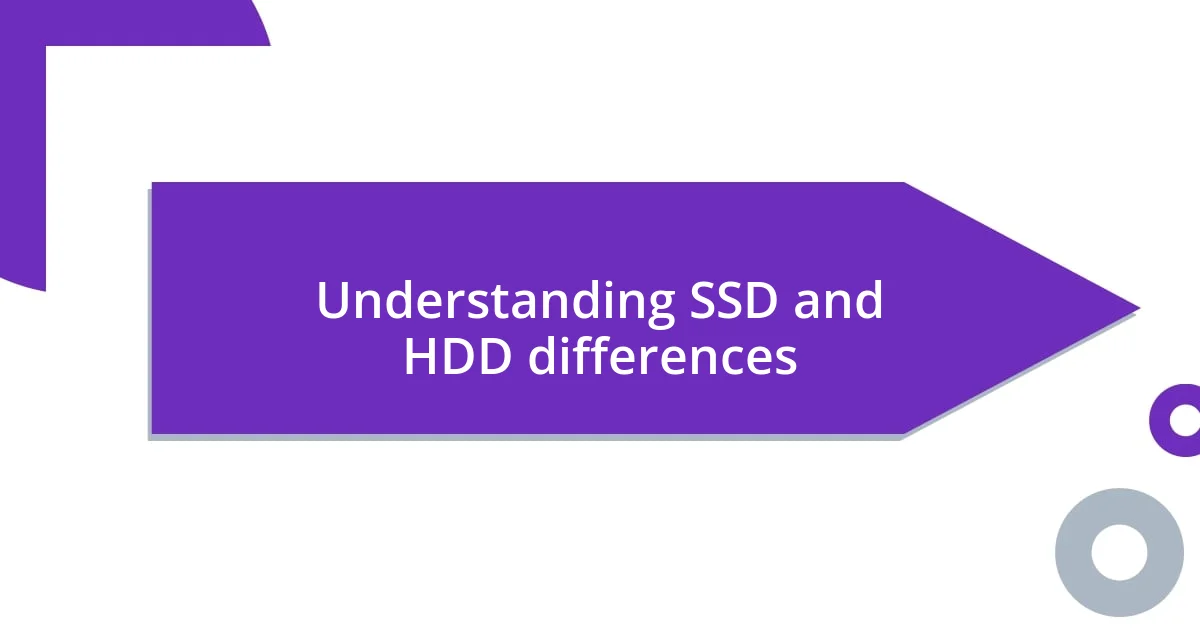
Understanding SSD and HDD differences
When I first encountered the debate between SSDs (Solid State Drives) and HDDs (Hard Disk Drives), I was struck by how much my choices could affect performance. SSDs are all about speed; they use flash memory to access data almost instantaneously, while HDDs rely on spinning disks, leading to longer waiting times. It dawned on me that choosing an SSD could feel like upgrading from a bicycle to a sports car in terms of how quickly I could access files—what a game-changer!
Another key difference lies in durability. I remember accidentally dropping an old laptop with an HDD; the hard drive failed, and I lost years of work. SSDs, with no moving parts, are far more resilient to physical shock and wear. It makes me wonder—how much peace of mind is worth investing in that extra durability?
Cost is also a significant factor. Initially, I balked at the price of SSDs compared to HDDs, but as I weighed the performance benefits and potential longevity, it became clearer. Isn’t it worth spending a little more if it means I won’t need to replace my drive as often? These are the considerations that truly influenced my understanding of choosing between the two.
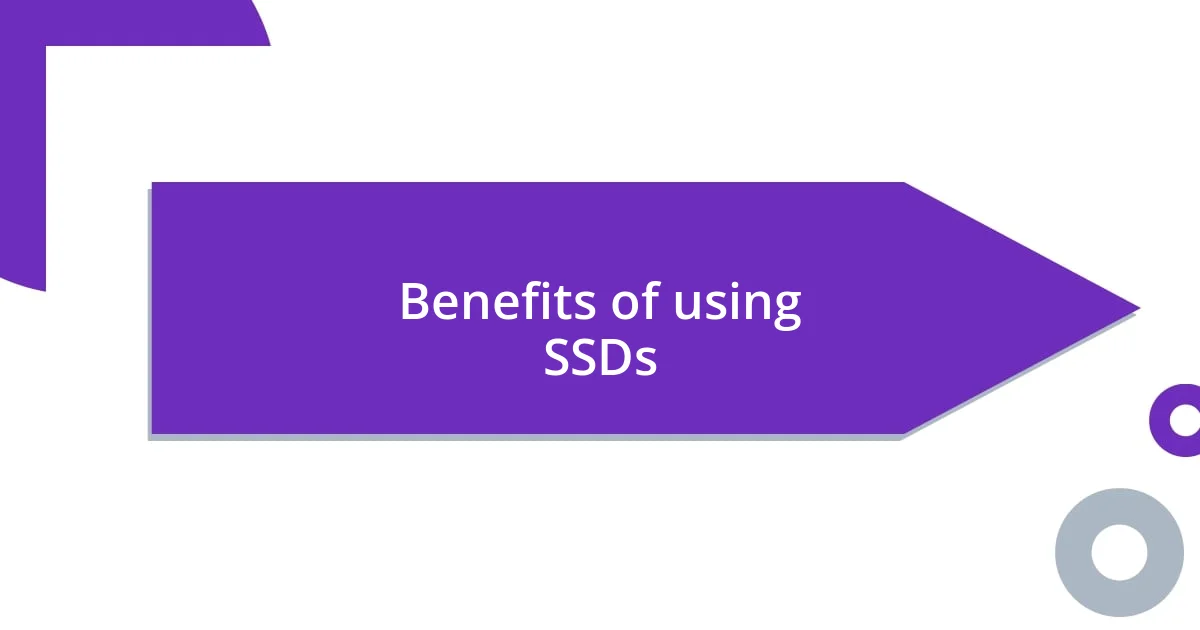
Benefits of using SSDs
When I finally made the switch to an SSD, it felt like unlocking a new level of efficiency. The boot-up time on my laptop plummeted from several minutes to mere seconds, which transformed my morning routine. I genuinely felt excited every time I powered it on, knowing that I could dive into my work instantly, rather than waiting around.
Here are some standout benefits of using SSDs:
- Speed: SSDs offer lightning-fast data access and transfer speeds, making everything from booting up to loading applications a breeze.
- Durability: With no moving parts, SSDs are less susceptible to physical damage, which inspired my confidence when I traveled with my laptop.
- Energy Efficiency: They consume less power, which not only extends battery life but also keeps my devices cooler, so they run quietly and smoothly.
- Noise Operation: Unlike HDDs, SSDs operate silently—removing that whirring sound from my workspace, which I didn’t realize I’d missed until it was gone.
I’ve experienced firsthand how much of a difference these factors can make in daily use. Transitioning to SSD was one of the most rewarding tech decisions I’ve made.
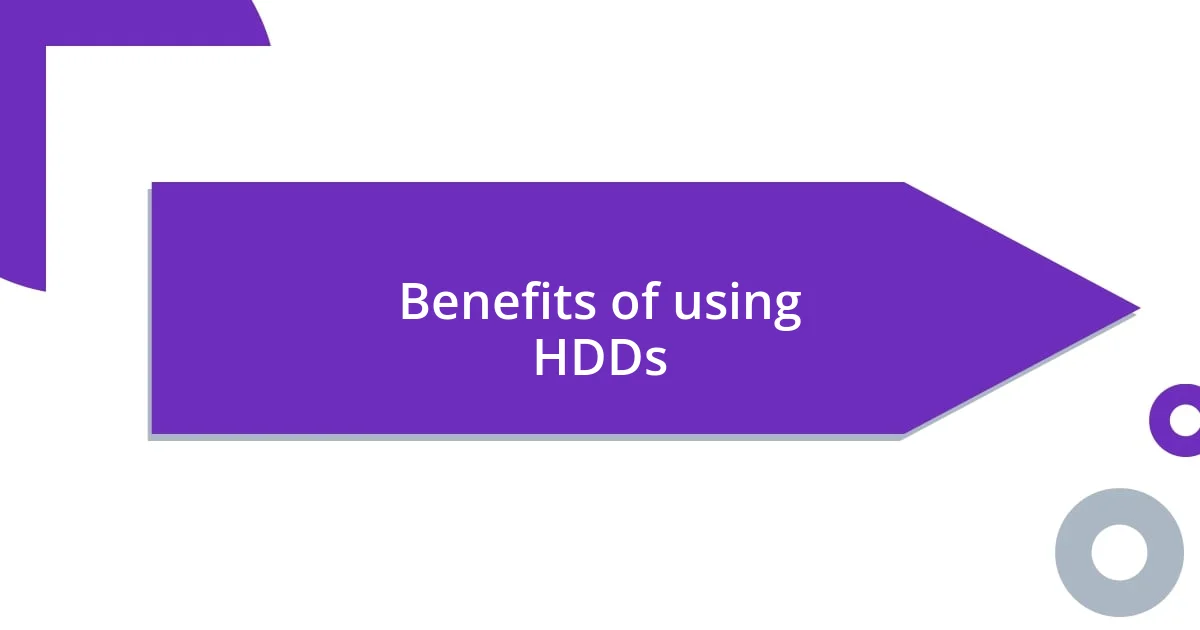
Benefits of using HDDs
Using HDDs certainly comes with some noteworthy benefits that shouldn’t be overlooked. One major advantage is their affordability. I remember my first computer build, and while I splurged on a powerful GPU, I opted for an HDD. It allowed me to maximize my storage without breaking the bank, giving me ample room for games, documents, and personal projects without stressing about expenses.
Another perk of HDDs is their ability to offer large storage capacities. I once had a 4TB HDD that housed my entire media library, from movies to music. The sheer volume meant I could easily store what I wanted without constantly deleting files to create space, creating a sense of freedom that I cherished. For anyone who requires a lot of storage without needing extreme speed, HDDs continue to shine.
Lastly, the lifespan of HDDs can be quite impressive. While they may not have the same longevity as SSDs in terms of resistance to damage, I’ve had several HDDs last for years of consistent use. The ability to swap them easily into another computer or an external casing makes them a practical choice for backups. There was something so satisfying about knowing I could keep all my cherished memories securely stored on these drives, despite the passing years.
| Benefit | Description |
|---|---|
| Affordability | HDDs generally offer lower price-per-gigabyte, making them budget-friendly options for storage. |
| Large Capacity | They come in very high capacities, ideal for extensive data storage needs. |
| Longevity | With good care, HDDs can function effectively for many years, often lasting through multiple migrations to new systems. |
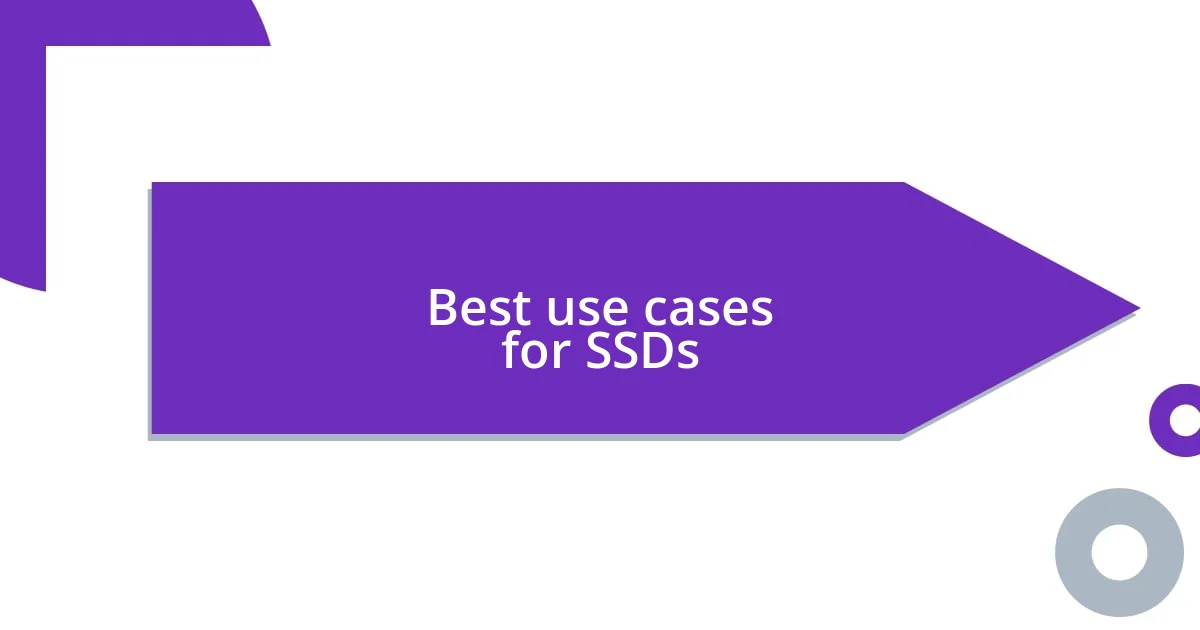
Best use cases for SSDs
I often find SSDs to be a game changer for gaming enthusiasts or creative professionals. The speed benefits can’t be overstated—when I upgraded my gaming rig to an SSD, loading times reduced dramatically. I remember diving into games much faster, and that competitive edge during online matches felt exhilarating. Can you imagine the thrill of jumping straight into action while others are still stuck on loading screens?
SSDs also excel in business environments where efficiency is key. During my time managing a busy office, switching to SSDs in our workstations brought an immediate improvement in productivity. Document loading and software boot times were significantly reduced, leading to smoother workflow and less frustrating delays. Isn’t it amazing how the right tech can amplify teamwork and enhance the overall workplace vibe?
For those who travel frequently or work on the go, SSDs become indispensable. I used to dread carrying around an external hard drive, fearing the inevitable wear and tear from travel. Since switching to an SSD, I’ve enjoyed the lightweight, compact design without sacrificing performance. The peace of mind knowing my data is secure and that I can access it nearly instantaneously is worth its weight in gold. How much simpler has travel become for you since adopting faster tech?
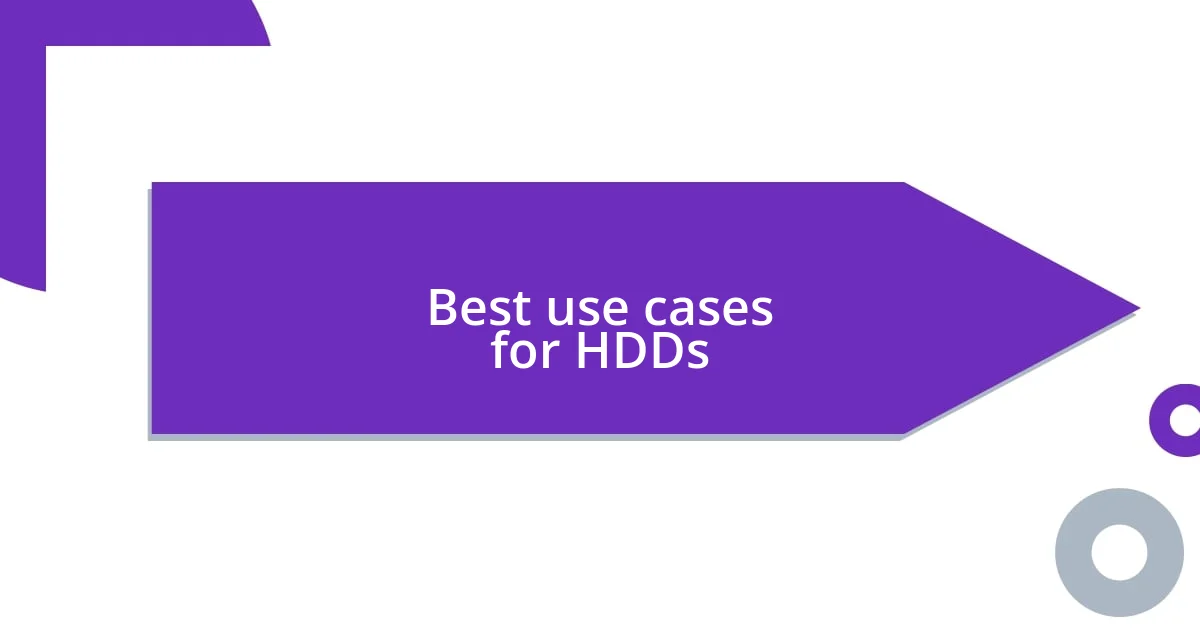
Best use cases for HDDs
When I think of the best use cases for HDDs, media storage immediately comes to mind. A couple of years ago, I curated a massive collection of old family videos and photos. Storing them on an HDD felt like a safety net; it was affordable and had enough space to accommodate everything I wanted preserved. Plus, knowing that I could easily access my family’s cherished memories without worrying about running out of space was incredibly reassuring.
Another fantastic application for HDDs is in data backup solutions. I recall setting up a backup system for a friend’s small business. We used a network-attached storage (NAS) solution with high-capacity HDDs to ensure all their important files were securely saved. It’s comforting to know that in case of mishaps like accidental deletions or hardware failures, everything is backed up and retrievable.
Finally, I’ve found HDDs to be superb for archiving purposes. I ran an online blog where I needed to keep old posts and resources at hand for reference without them cluttering my primary storage. Utilizing an HDD for this task made the organization easy and efficient. Have you ever felt the satisfaction of unburdening your main system while still retaining access to past work? It can seriously transform your digital space!












